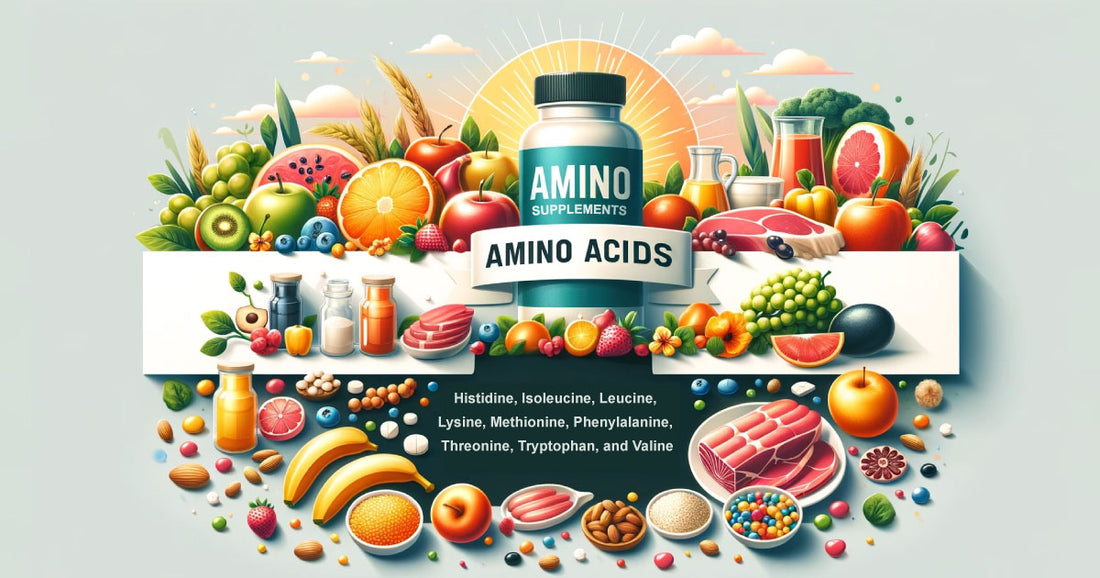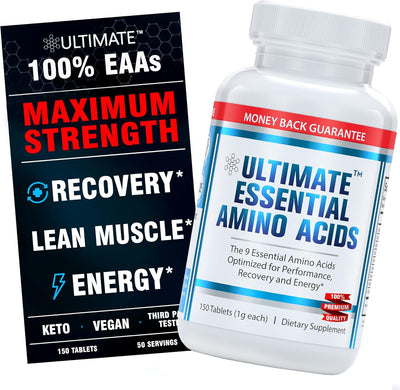
Which EAA is necessary for your health?
Essential Amino Acids (EAAs) are at the heart of this nutritional narrative, being the building blocks of the proteins that make us function. They are 'essential' for a reason; our bodies can't produce them, so they must be obtained through the foods we eat. In this comprehensive guide, we’re exploring which EAAs are crucial for various populations, the sources where you can find them, and the potentially life-altering benefits of ensuring your EAA intake is optimal.
Understanding The Essential in EAAs
The importance of EAAs can’t be overstated. They are indispensable for the creation of muscle, skin, hair, and other tissues. The nine EAAs are histidine, isoleucine, leucine, lysine, methionine, phenylalanine, threonine, tryptophan, and valine. But knowing about them as a collective is different from understanding their significance to different groups of individuals. Here’s a breakdown:
Histidine
- General Importance: Histidine is crucial for the growth and repair of tissues, and it also plays a role in the production of histamine, which is vital for immune response, digestion, sexual function, and sleep-wake cycles.
- Specific Needs: Infants and children may have a higher need for histidine for growth and development. Athletes also benefit from histidine for tissue repair post-exercise, and individuals experiencing stress may need higher amounts to support optimal health. Supplements can be a practical solution for these groups, offering a targeted boost where necessary.
Isoleucine
- General Importance: Isoleucine is involved in muscle metabolism and is heavily concentrated in muscle tissue. It's important for immune function, hemoglobin production, and energy regulation.
- Specific Needs: Athletes or individuals engaging in heavy physical activity may benefit from more isoleucine for muscle repair and recovery. Isoleucine has been linked to wound healing and the production of hemoglobin.
Leucine
- General Importance: Leucine is crucial for protein synthesis, muscle repair, and regulating blood sugar levels. It also helps to stimulate growth hormone production.
- Specific Needs: This is especially important for children, who are still growing. For adults, leucine helps regulate blood sugar levels and can aid in increasing muscle strength in the elderly. Older adults and athletes may need more leucine to help maintain muscle mass and promote recovery from exercise.
Lysine
- General Importance: Lysine is important for protein synthesis, hormone and enzyme production, and the absorption of calcium. It also plays a key role in the production of collagen and elastin.
- Specific Needs: Women, especially those who are pregnant or breastfeeding, may need more lysine for fetal and child growth and development. This is essential for children, vegans, and those engaged in strenuous physical activity. Supplements can help in strengthening the immune system, repairing tissues, and ensuring proper growth.
Methionine and Cysteine
- General Importance: Methionine plays a role in metabolism and detoxification. It's necessary for tissue growth and the absorption of zinc and selenium, minerals crucial for health.
- Specific Needs: Vegetarians or vegans may need to pay more attention to consuming enough methionine, as it is typically lower in plant-based diets.
Phenylalanine
- General Importance: Phenylalanine is a precursor for the neurotransmitters tyrosine, dopamine, epinephrine, and norepinephrine. It's important for the structure and function of proteins and enzymes and the production of other amino acids. It's also important for the formation of dopamine, which affects mood, and adrenaline, which gives you that fight-or-flight response in times of stress.
- Specific Needs: Individuals with PKU (Phenylketonuria) need to manage phenylalanine intake carefully, as they cannot metabolize this amino acid properly.
Threonine
- General Importance: Threonine is important for collagen, elastin, and muscle tissue. It also plays a role in fat metabolism and immune function.
- Specific Needs: Individuals with digestive issues or chronic illnesses may need more threonine for repair and maintenance of the digestive tract.
Tryptophan
- General Importance: Tryptophan is a precursor for serotonin, a neurotransmitter important for mood, sleep, and appetite regulation.
- Specific Needs: Individuals under stress or with poor sleep patterns may benefit from more tryptophan in their diet to support serotonin production.
Valine
- General Importance: Valine is important for muscle growth and tissue repair, energy production, and regulating blood sugar levels.
- Specific Needs: Similar to isoleucine and leucine, athletes and those engaged in physical training may need more valine for muscle metabolism and recovery.
Fueling Your Body: Rich Food Sources of EAAs
Ensuring you get all nine EAAs in your diet isn’t as complicated as it may seem. Consuming a varied diet that includes the following sources can fulfill your EAA needs:
- For histidine: meat, poultry, and fish; vegetarian sources include potatoes, wheat, and rice
- For isoleucine and valine (BCAAs): meat, fish, and poultry, as well as legumes, nuts, and seeds
- For leucine: soy, peanuts, and meat
- For lysine: beef, poultry, and eggs; vegetarians should include legumes, grains, and seeds in their diet
- For methionine: nuts, seeds, grains, and meat
- For tryptophan: turkey, chicken, and salmon; vegan sources include pumpkin seeds, oats, and spinach
- For phenylalanine: meat, fish, eggs, and dairy; vegan sources include soy, beans, and lentils
By including a selection of these foods in your diet, you create a balance of EAAs that is essential for your health and well-being.
The EAA Supplement Solution
While consuming a balanced diet rich in EAAs is vital, there are instances when supplementation is recommended. Supplements offer a concentrated dose of specific amino acids that can be beneficial for certain groups:
- Infants: Due to their rapid growth, infants may require higher amounts of certain EAAs. A specialist may recommend supplementation for optimum development.
- Athletes: Supplements can aid in recovery, muscle synthesis, and endurance, especially during intense training periods
- Vegans: As certain EAAs are more readily available in animal products, supplementation can balance their intake for vegans
- Stressed individuals: High levels of stress may increase the body's need for healing and immune-supporting nutrients, making EAA supplementation beneficial
Supplements, when used appropriately, can be an effective tool for ensuring your EAA intake is tailored to your individual needs.
Consequences of EAA Deficiency
A deficiency in EAAs can lead to various health issues, including anemia, decreased muscle mass, fatigue, and skin lesions. It can also impact cognitive function, immunity, and overall growth. Understanding the potential implications of EAA deficiency underscores the critical need for these amino acids in maintaining our health.
The Call to Action for EAA Consumption
Whether you're a parent, an athlete, or simply someone striving for optimal health, paying attention to your EAA intake can make a significant difference. By incorporating EAAs into your diet through natural food sources and smart supplementation, you actively invest in your well-being.
Take charge of your health by ensuring you're not only eating to live but eating to thrive. Consult with a healthcare professional to understand your specific EAA needs and how to best incorporate them into your lifestyle. Remember, the essential in EAAs is there for a reason – it's about offering your body the fundamental elements necessary for a healthy, robust life.


